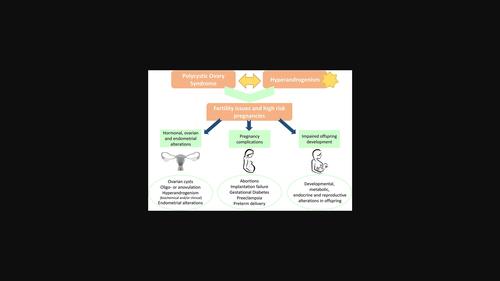Hyperandrogenism and Polycystic ovary syndrome: Effects in pregnancy and offspring development.
IF 4.9
3区 医学
Q2 MEDICINE, RESEARCH & EXPERIMENTAL
引用次数: 8
Abstract
Polycystic ovary syndrome (PCOS) is one of the major endocrine disorders affecting women of reproductive age. Its etiology remains unclear. It is suggested that environmental factors, and particularly the intrauterine environment, play key roles in PCOS development. Besides the role of androgens in PCOS pathogenesis, exposure to endocrine disruptors, as is Bisphenol A, could also contribute to its development. Although PCOS is considered one of the leading causes of ovarian infertility, many PCOS patients can get pregnant. Some of them by natural conception and others by assisted reproductive technique treatments. As hyperandrogenism (one of PCOS main features) affects ovarian and uterine functions, PCOS women, despite reaching pregnancy, could present high-risk pregnancies, including implantation failure, an increased risk of gestational diabetes, preeclampsia, and preterm birth. Moreover, hyperandrogenism may also be maintained in these women during pregnancy. Therefore, as an altered uterine milieu, including hormonal imbalance, could affect the developing organisms, monitoring these patients throughout pregnancy and their offspring development is highly relevant. The present review focuses on the impact of androgenism and PCOS on fertility issues and pregnancy-related outcomes and offspring development. The evidence suggests that the increased risk of pregnancy complications and adverse offspring outcomes of PCOS women would be due to the factors involved in the syndrome pathogenesis and the related co-morbidities. A better understanding of the involved mechanisms is still needed and could contribute to a better management of these women and their offspring. This article is categorized under: Reproductive System Diseases > Molecular and Cellular Physiology Reproductive System Diseases > Environmental Factors.

高雄激素和多囊卵巢综合征:对妊娠和后代发育的影响。
多囊卵巢综合征(PCOS)是影响育龄妇女的主要内分泌疾病之一。其病因尚不清楚。提示环境因素,尤其是宫内环境在多囊卵巢综合征的发生中起关键作用。除了雄激素在多囊卵巢综合征发病中的作用外,暴露于内分泌干扰物,如双酚A,也可能有助于多囊卵巢综合征的发展。虽然多囊卵巢综合征被认为是卵巢不育的主要原因之一,但许多多囊卵巢综合征患者可以怀孕。其中一些人通过自然受孕,另一些人通过辅助生殖技术治疗。由于雄激素分泌过多(PCOS的主要特征之一)影响卵巢和子宫功能,PCOS患者即使已经怀孕,也可能出现高危妊娠,包括着床失败、妊娠糖尿病、先兆子痫和早产的风险增加。此外,这些妇女在怀孕期间也可能维持高雄激素症。因此,由于子宫环境的改变,包括激素失衡,可能会影响发育中的生物,因此在整个妊娠期间监测这些患者及其后代的发育是非常重要的。本文综述了雄激素和多囊卵巢综合征对生育问题、妊娠相关结局和后代发育的影响。有证据表明,PCOS妇女妊娠并发症和不良后代结局的风险增加可能与综合征发病机制及其相关合并症相关因素有关。仍然需要更好地了解所涉及的机制,并有助于更好地管理这些妇女及其后代。本文分类为:生殖系统疾病bbb分子与细胞生理>环境因素。
本文章由计算机程序翻译,如有差异,请以英文原文为准。
求助全文
约1分钟内获得全文
求助全文
来源期刊

WIREs Mechanisms of Disease
MEDICINE, RESEARCH & EXPERIMENTAL-
CiteScore
11.40
自引率
0.00%
发文量
45
 求助内容:
求助内容: 应助结果提醒方式:
应助结果提醒方式:


